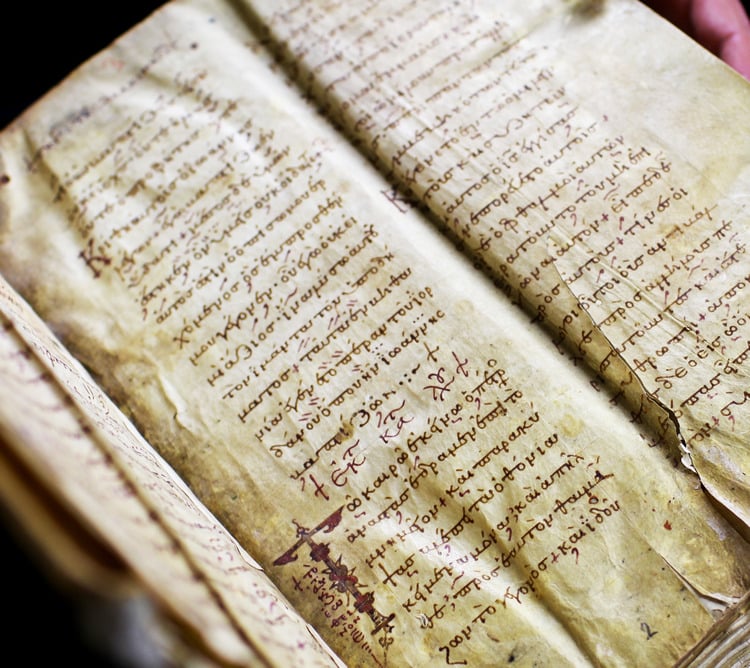Afterwords -- testimony

"And John [the Baptist] bore witness: I saw the Spirit descend from heaven like a dove, and it remained on him. I myself did not know him, but he who sent me to baptize with water said to me, 'He on whom you see the Spirit descend and remain, this is he who baptizes with the Holy Spirit.' And I have seen and have borne witness that this is the Son of God." (John 1:32-34)
"This is the disciple who is bearing witness (ὁ μαρτυρῶν) about these things, and who has written (ὁ γράψας) these things, and we know that his testimony (αὐτοῦ ἡ μαρτυρία) is true." (John 21:24)
September 8, 2023
Dear friends,
I'm reading the Gospel of John right now and have been struck by the fact that what we believe is based upon the testimony (or witness) of others. John's Gospel opens and closes with, and is filled with, appeals to the testimony (μαρτυρία marturia, 15x in the gospel) which people give. To give testimony (μαρτυρέω, martureō, 31x) is to bear witness to something being true. The gospel ends with, "This is the disciple [the Apostle John] who is bearing witness about these things, and who has written these things, and we know that his testimony is true." (21:24)
We are told that this witness was written down (21:24). In fact, all of Scripture is called the "testimony" of the Lord, that is, God bearing witness to himself and to what is true (Ps 19:7; 119:24). The parallel Hebrew word (עדות `ëdûth) has the sense of "warning signs, reminders, urgings", that is, God is speaking the truth that we should seriously heed. Scripture itself is the written record of God's words and works, and the promise is given, that God is able to preserve those words for us forever (Ps 119:89, 160; Isa 40:8; 1 Pet 1:25). So, our trust is in the testimony of the ancient witnesses, but whose testimonies are preserved by the eternal God, who himself bears witness to the truth.
That our faith is based upon the testimony of others, even ancient testimony (since time doesn't change facts), should not trouble us at all. The truth is, almost everything we know even today is based upon the word and reputation of others. We do not have first-hand experience with the vast amount of things we claim to know. The findings of science, the events of history, medical recommendations, studies of nature, and even the daily weather forecast come to us as reports from others in whom we place our trust. Anyone who has sat on a jury knows the critical importance of a trustworthy witness. Think about it: what do you actually, really know in fact about anything that you did not receive from others? Maybe you know what you had for breakfast, but the contents, the label, the calorie count... even there, you trust what others have written.
A further point from this first chapter of John -- the role of testimony, or being a witness, is an ongoing part of the Christian life and mission. John the Baptist bears witness to all, and to his disciples, about what he has seen and knows to be true about Jesus. Andrew, a follower, then finds his brother Simon and says, "We have found the Messiah" (1:41). Then Philip finds his brother Nathaniel, saying, "We have found him of whom Moses in the Law and also the prophets wrote, Jesus of Nazareth, the son of Joseph." (1:45) They report to their siblings what they have seen and now believe to be true about Jesus. "We have found him," they said.
To share our testimony means, then, not so much sharing the gospel message, as important as that is (1 Cor 15:1-8), or how a person can be saved (Acts 16:30). Nor is it about telling how bad you were and how you've changed because of Christ. It's saying that you've found the message about Jesus to be true. "This is the disciple who is bearing witness about these things, and who has written these things, and we know that his testimony is true." (21:24) And if you've never heard it from me, either in person or online, I too have found it to be true -- Jesus is Messiah, Lord, Savior... all that Scripture claims him to be. It's true.
The testimonies of the first disciples to their brothers were followed by, "come and see." One of the best things we can do in personal evangelism is to say that we have come to believe what the Bible says about Jesus, and then give them, or invite them to read, the Gospels (or the NT) for themselves. This is the testimony. We can't take them to Jesus in bodily form, but we certainly can give them the written testimony from those who witnessed Jesus' life, death, and resurrection. That word is living and active (Heb 4:12), and Jesus promised that the Holy Spirit would do the convincing (John 16:8-11).
SOME UPDATES. We give thanks to God for coming through another bout with COVID, which is no small matter! Lately, I've been editing and uploading my Bible reading guides (now through Ruth), along with my Afterwords newsletters of 2022, here. Meanwhile, things are really dry in Virginia, and we are so thankful for last night's much-needed rain. And as of today, the Hokies are 1-0 in football this season, but another Saturday's coming, like, tomorrow.
ARTICLES.
-- Here's a good overview by Greg Koukl, on the reliability of the NT text.
-- "The next time you look at your favorite biblical passage in church or at home, you might also want to take a moment and consider the thousands of years of history that lie beneath the printed letters on the page." (A Brief History of Greek Handwriting)
-- On credibility in scientific reporting: “So much of social science is propaganda masquerading as science.” (Lee Jussim, social psychologist, Rutgers) Read "The Misogyny Myth" here.
-- A bit more about fantasy, specifically, George MacDonald: "But the great thought which Dr. MacDonald utters and leaves unuttered alike in a kind of fatalistic optimism will never wholly cease to haunt and attack us. At a hundred odd moments, in corked streets, in twilight fields, in lamp-lit drawing-rooms, there will come upon us the confounding, and yet comforting, notion that we and all our nationalistic philosophies are all in the heart of a fairy tale and playing an uncommonly silly part in it." (G. K. Chesterton, on George MacDonald)
-- A remarkable gorilla, but "Did Koko’s Large Vocabulary Challenge Human Exceptionalism?"
-- An update on the excavation at the Pool of Siloam in Jerusalem (see rendering below).
LISTENING TO... the music of Steph MacLeod. (What's not to like about the bluesy style of this Scottish musician?) Here's a sampling: "Let There Be Light" and "O Perfect Father"
FINAL QUOTE. "Whereas in the Old Testament everything was prepared for Christ, now everything is derived from him. Christ is the turning point of time." (Herman Bavinck)
That's it for this week!
Sandy
Image credit: photo above courtesy of the Center for the Study of New Testament Manuscripts (csntm.org). Below: Rendering of the Pool of Siloam, courtesy of Shalom Kveller & City of David Archives. Unless otherwise indicated, all Scripture quotations are from The ESV Bible (The Holy Bible, English Standard Version), copyright 2001 by Crossway, a publishing ministry of Good News Publishers. Used by permission. All rights reserved.
